It’s 10 PM, and I’m sprawled on my couch, ready to finally chill after a long day. I swear I’m just gonna check one email, but then my phone lights up with a work Slack message, a group chat ping, and some random Instagram notification. Next thing I know, it’s 11:30, and I’m typing a reply to my boss about a project that’s not even due till next week. My eyes are burning, my brain’s buzzing, and I’m exhausted but I can’t stop. Sound familiar? 😴
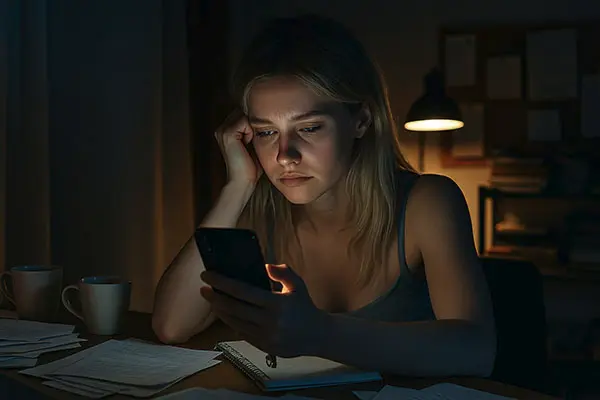
This is the emotional exhaustion of always being available online. It’s that sinking feeling when you realize your phone’s basically glued to your hand, and you’re on call for work, friends, or even strangers on social media 24/7. It’s not just about wasting time it’s about the mental toll of never getting a break. In this article, we’re gonna dive into why this happens, how it sneaks into your life, why it’s so dang draining, and what you can do to take back your peace.
We’ll cover stuff like digital burnout, social media fatigue, and how to set boundaries without feeling like a jerk. Plus, we’ll answer those big questions like, “What’s digital overwhelm?” and “How do I fight it?” Ready to unplug a little? Let’s do this
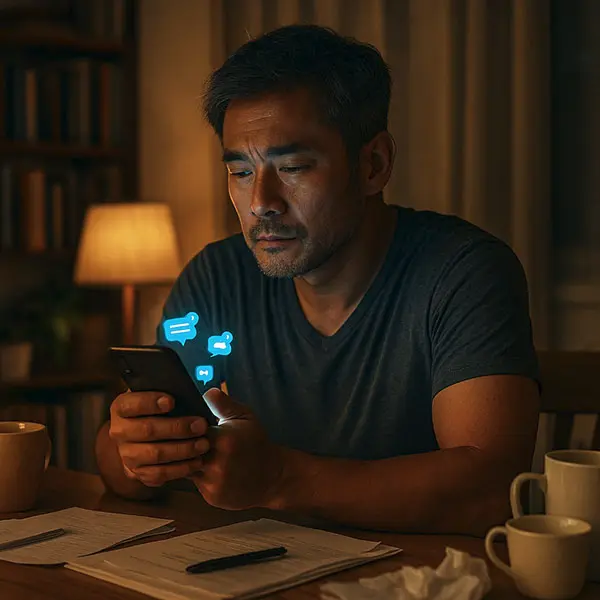
What Is Digital Exhaustion?
Digital exhaustion sometimes called digital fatigue or burnout-is that bone-deep tiredness you feel after too much time on screens. It’s not just your eyes feeling strained; it’s your whole mind and body feeling like they’ve been through a marathon. According to McLean Hospital, it’s the “feelings of anxiety, exhaustion, and apathy caused by spending too much time on digital devices.” Think of it like your brain’s battery running on empty from all the notifications, emails, and endless scrolling.
Here’s what it looks like:
 Digital Burnout: A state of mental and emotional exhaustion from prolonged device use, often tied to work. You might feel unmotivated, cynical, or just done with your job.
Digital Burnout: A state of mental and emotional exhaustion from prolonged device use, often tied to work. You might feel unmotivated, cynical, or just done with your job. Digital Overstimulation: When your brain’s overwhelmed by too much digital input like constant notifications or social media feeds making it hard to focus or relax.
Digital Overstimulation: When your brain’s overwhelmed by too much digital input like constant notifications or social media feeds making it hard to focus or relax. Digital Overwhelm: Feeling swamped by the sheer volume of info, from emails to news alerts, leaving you stressed and scattered.
Digital Overwhelm: Feeling swamped by the sheer volume of info, from emails to news alerts, leaving you stressed and scattered. Social Media Fatigue: That drained, disengaged feeling from too much time on platforms like Instagram or Twitter, where you’re comparing yourself or dodging drama.
Social Media Fatigue: That drained, disengaged feeling from too much time on platforms like Instagram or Twitter, where you’re comparing yourself or dodging drama. Digital Anxiety: The jittery, on-edge vibe from always needing to check your phone, worried you’ll miss something important.
Digital Anxiety: The jittery, on-edge vibe from always needing to check your phone, worried you’ll miss something important.
Symptoms? Oh, they’re real. You might feel chronic fatigue, irritability, headaches, or trouble sleeping. Your focus might be shot, and you could even feel a bit numb, like you’re just going through the motions. I’ve had nights where I couldn’t sleep because my brain was replaying a work email I didn’t answer. That’s digital exhaustion in action, and it’s a lot. 😣
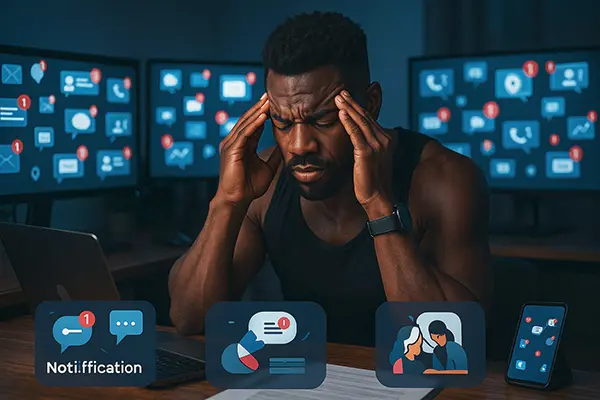
How Constant Availability Creeps In
It starts so innocently. You check your work email after dinner “just in case.” You keep your phone by your side to reply to a friend’s text. You scroll Twitter to stay in the loop. Before you know it, you’re expected to be online all the time. It’s like your phone’s become an extra limb, and you’re on call for everyone your boss, your bestie, even that random group chat from high school.
Smartphones and apps are designed to keep you hooked. Those little red notification dots? They’re like candy for your brain, triggering dopamine hits that make you wanna check again and again. Forbes says the average American spends over 7 hours a day on screens, and that’s not just work it’s social media, streaming, you name it. Work culture doesn’t help either. In some jobs, replying to a 9 PM email is seen as a badge of honor, not a red flag.

Then there’s FOMO fear of missing out. You worry you’ll miss a critical work update or that your friends will think you’re ghosting them if you don’t reply right away. I remember one weekend, I was on a hike, trying to enjoy the sunset, but I kept checking my phone because my work Slack was buzzing.
I wasn’t even needed, but the fear of missing something kept me glued to it. That’s how constant availability sneaks in it’s a slow creep, not a sudden leap
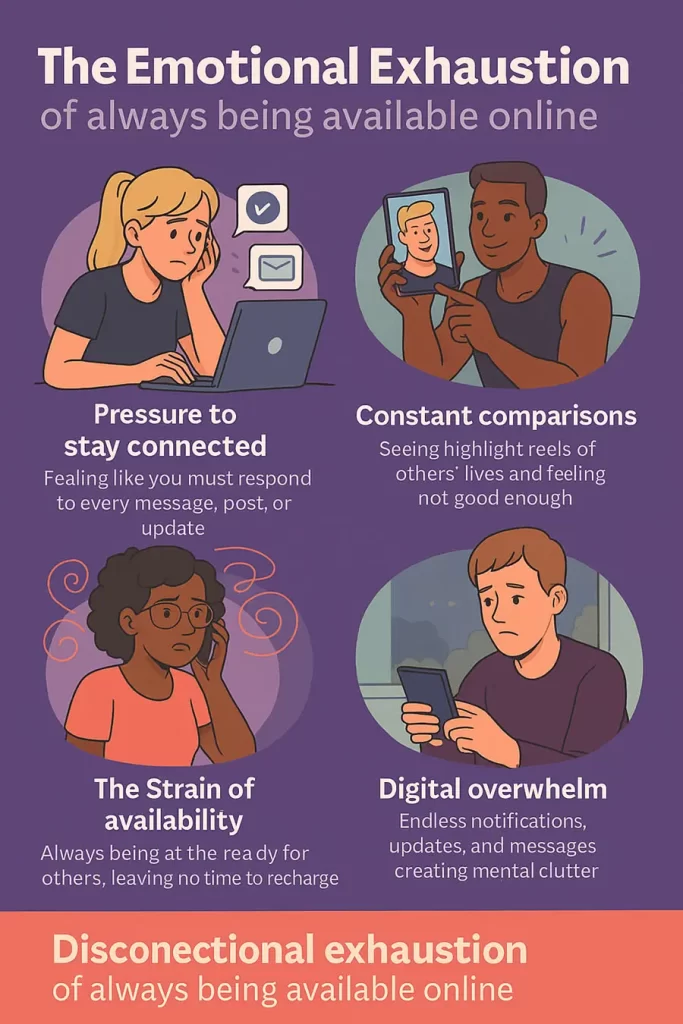
Why It’s So Emotionally Draining
Being always online isn’t just tiring it’s a full-on emotional drain. Here’s why:
- No Downtime: When you’re constantly checking your phone, your brain never gets a break. It’s like running a marathon without stopping for water. Psychology Today says this lack of downtime can tank your creativity and make you feel like you’re just existing.
- Stress and Anxiety: The pressure to respond instantly keeps your brain in fight-or-flight mode, pumping out cortisol like it’s going out of style. This can lead to digital anxiety, where you’re jittery and restless, always waiting for the next ping.
- Sleep Disruption: Scrolling before bed messes with your melatonin, making it harder to fall asleep. Sleep Foundation says blue light from screens can delay sleep by up to 30 minutes. I’ve had nights where I couldn’t sleep because I was stressing about a work message I saw at 11 PM.
- Overstimulation: Too much digital input like notifications, news, or social media drama overwhelms your brain, leading to what’s called digital overstimulation. It’s like your mind’s trying to process a million things at once, leaving you foggy and irritable.
- Burnout: Digital burnout is when you’re so exhausted from constant connectivity that you feel apathetic or unmotivated. McLean Hospital says 87% of office workers report fatigue or depression from digital overload. That’s a lot of us feeling like zombies.
👉🏻 Why Digital Overload Hits Your Sleep 👈🏻
I remember one week where I was juggling work emails, a group chat, and Twitter notifications. By Friday, I was so fried I could barely focus on a simple conversation with my roommate. My brain was just done. That’s what digital exhaustion does it steals your energy and leaves you running on fumes
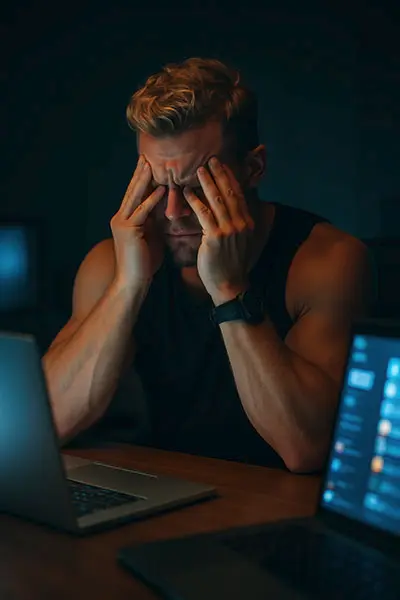
The Guilt Loop That Keeps You Hooked
Here’s the sneaky part: even when you want to disconnect, guilt keeps you hooked. You try to mute your notifications, but then you worry, “What if my boss needs me? What if my friends think I’m ignoring them?” It’s like a guilt loop that traps you in constant availability.
This guilt comes from a few places:
- Societal Pressure: We’re taught that being responsive is being responsible. If you don’t reply to a work email in 10 minutes, you’re “slacking.” I felt this hard when I tried to stop checking emails on weekends my brain was like, “You’re letting everyone down!”
- FOMO: You’re scared you’ll miss something critical, like a work update or a friend’s big news. This fear keeps you checking, even when you’re exhausted.
- People-Pleasing: If you’re a people-pleaser like me, saying no to being available feels like letting someone down. I once stayed up late replying to a friend’s texts because I didn’t want them to think I was flaky.
The loop goes like this: you feel guilty for not being available, so you stay online, which makes you exhausted, but then you feel guilty for wanting to disconnect, so you stay online… and round and round it goes. Breaking this cycle is tough, but it’s doable with the right mindset and tools. 😊
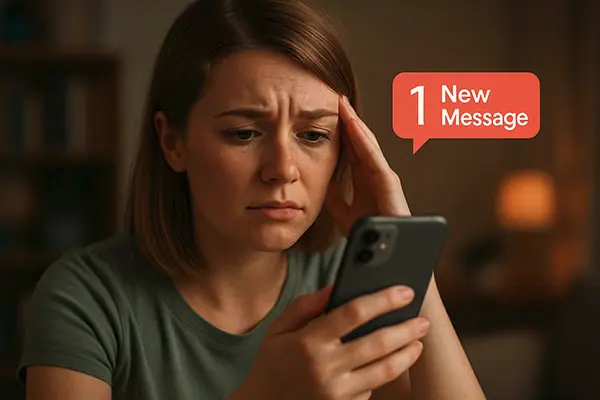
How It Impacts Relationships and Self-Worth
Always being online doesn’t just drain you it hits your relationships and self-worth too. When you’re glued to your phone, you’re physically there but mentally checked out. I’ve been at family dinners where I’m half-listening, half-scrolling, and it makes my mom feel like she’s talking to a wall. It’s not just rude it creates distance. Verywell Mind says constant device use can weaken real-life connections, making loved ones feel ignored.
Self-worth, if you tie your value to how fast you reply or how many likes you get, you’re setting yourself up for a fall. Social media fatigue feeling drained from comparing yourself to others or chasing validation can tank your confidence. I used to obsess over my Instagram engagement, like my worth depended on it. Spoiler: it doesn’t. Your value’s in who you are, not how many notifications you get.
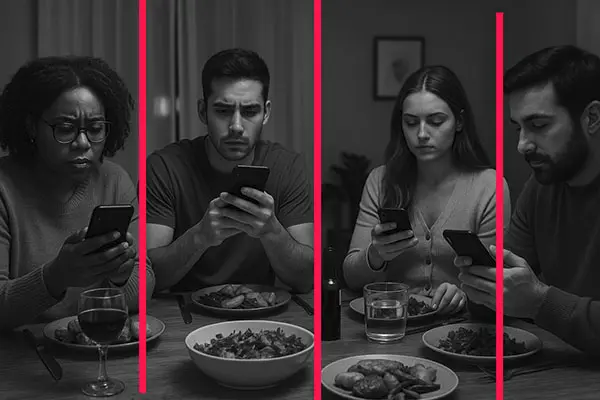
Emotional Exhaustion Online Availability
For the LGBTQ+ community, this can hit even harder. Online spaces are often a lifeline for connection and support, but they can also expose you to negativity, like trolls or judgmental comments. A friend of mine who’s queer said they’d stay up late engaging in online debates, trying to defend their identity, only to feel drained and worthless after. Setting boundaries like curating feeds or taking breaks helped them protect their mental health while staying connected to affirming communities. It’s about finding balance, not cutting off what matters. 😊
How to Gently Reclaim Digital Boundaries
Ready to take back your peace? You don’t have to go full-on hermit mode. Here are some gentle, practical ways to set digital boundaries and fight digital burnout, backed by experts and my own trial-and-error:
3 Fastest Ways to Fight Digital Burnout and Recharge
- Digital Detox: Take a break from all devices for a few hours or a day. I tried a no-phone Sunday, and it was like a mini-vacation for my brain. McLean Hospital says even short breaks can reduce stress.
- Get Moving: Exercise like a quick walk or yoga releases endorphins that boost your mood and energy. I started doing 15-minute walks during lunch, and it’s like hitting reset.
- Connect with Nature: Spend time outdoors, phone-free. A hike in the woods or just sitting by a lake can calm your mind. I felt so much lighter after a screen-free afternoon at the park.
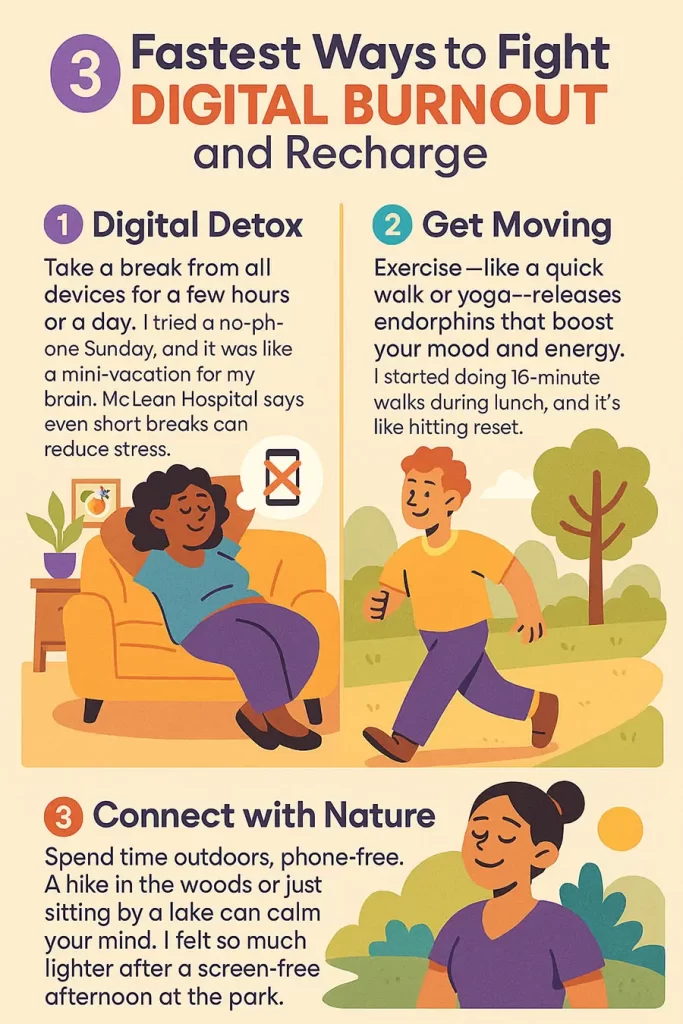
More Strategies to Set Boundaries
- Set Tech-Free Times: Pick hours when you’re offline, like after 8 PM. I started leaving my phone in the kitchen at night, and my sleep’s way better.
- Mute Notifications: Turn off non-essential alerts. I muted my group chats after 7 PM, and it’s cut my stress in half.
- Create Tech-Free Zones: Keep your bedroom or dining table device-free. My bedroom’s a no-phone zone now, and it’s like a sanctuary.
- Use Tech Tools: Apps like Screen Time or Digital Wellbeing can limit app use. I cap my social media at 30 minutes a day, and it’s freed up so much mental space.
- Communicate Boundaries: Tell your boss or friends you’re not always available. I told my team I’m offline after 6 PM unless it’s urgent, and they respect it.
- Practice Mindfulness: Try 5 minutes of deep breathing or meditation to stay present. I do a quick 4-4-4 breath (inhale, hold, exhale) when I’m tempted to check my phone.
- Curate Your Feed: Unfollow accounts that stress you out. I ditched news accounts and followed artists instead my feed’s a happier place now.
These aren’t rules just starting points. Pick one or two and see how it feels. You’ll be amazed at how much lighter you feel. 😊
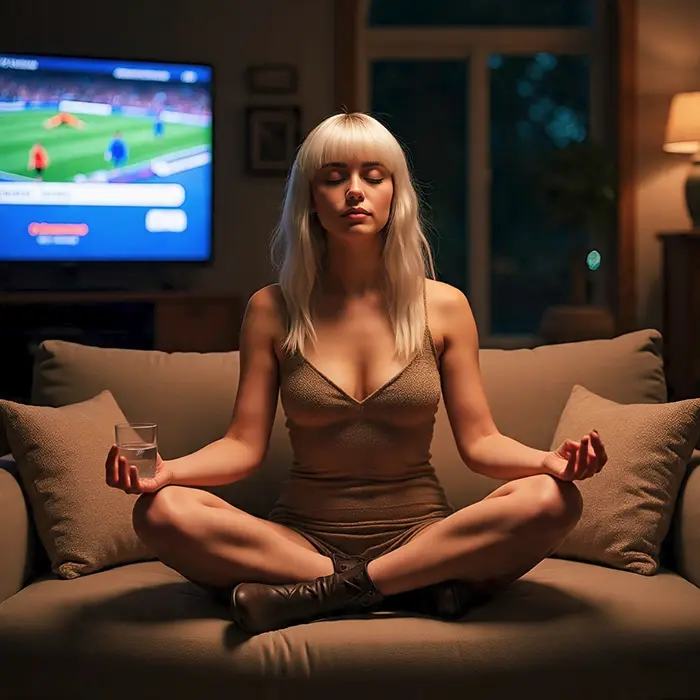
Digital Exhaustion and the LGBTQ+ Community
🏳️🌈 For folks in the LGBTQ+ community, the online world can be a double-edged sword. It’s a place to find community, share your truth, and connect with others who get it. But it can also be a minefield of negativity trolls, hate comments, or pressure to “perform” your identity online. Constantly engaging with these spaces, especially without breaks, can lead to digital exhaustion that hits harder because of the emotional stakes.
Constant Connectivity Stress
🌈 A friend of mine who’s trans said they’d stay up late responding to comments on Reddit, trying to educate others, only to feel drained and defeated. Setting boundaries like limiting time on toxic platforms or joining affirming groups helped them stay connected without burning out. It’s about protecting your energy while still finding your people. 😊
The Science Behind Digital Burnout
From a neuroscience perspective, constant connectivity messes with your brain big time. The barrage of notifications triggers dopamine spikes, making you crave that next ping, but it also floods your system with cortisol, the stress hormone. Scientific American says this overstimulation can shrink your attention span and make decision-making harder, leading to what’s called “decision fatigue.”
Your prefrontal cortex the part that handles focus and self-control gets overloaded, leaving you foggy and irritable. Over time, this can rewire your brain, reducing gray matter in areas tied to deep thinking. Taking breaks and setting boundaries helps your brain reset, giving it space to breathe and process
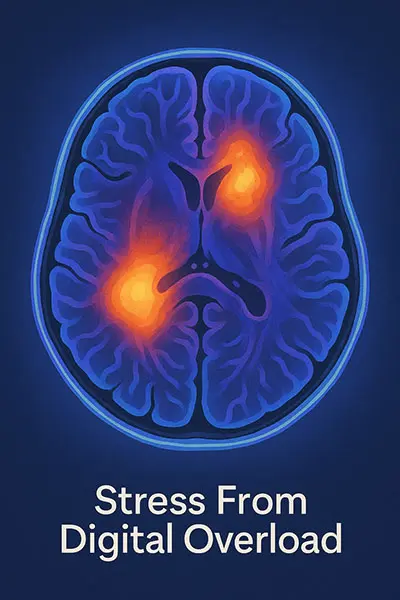
How to Start Setting Digital Boundaries
Time needed: 5 minutes
How to Start Setting Digital Boundaries
- Reflect on Your Needs
Ask yourself what’s draining you work emails, social media, or group chats?
- Pick One Boundary
Start small, like muting notifications after 8 PM.
- Communicate Clearly
Tell your boss or friends you’re offline at certain times, like, “I’m not checking emails after 6.”
- Create Tech-Free Zones
Keep your bedroom or dining table device-free.
- Take Breaks
Schedule 10-minute screen-free breaks during the day, like a quick walk.
- Practice Mindfulness
Try 5 minutes of deep breathing to stay present and resist checking your phone.
- Track Your Progress
Note how you feel after a week of boundaries and adjust as needed.
Conclusion
Always being available online is like running a marathon with no finish line it leaves you emotionally exhausted, stressed, and disconnected from what matters.
But you don’t have to stay stuck in that cycle. By understanding how constant connectivity creeps in, why it’s so draining, and how to set gentle boundaries, you can take back your peace and protect your mental health.
Start small mute one notification, take a walk without your phone, or just tell your brain it’s okay to rest. You’re not a robot, and you deserve a break.
So, what’s your first step gonna be? 😊

Feeling drained by your phone? Try one boundary this week and share your story in the comments. Let’s break the digital chains together!
Resources related to this topic
- McLean Hospital: Offers five practical strategies for recognizing and overcoming digital burnout and screen fatigue.
- Forbes: A blueprint for digital wellness in work life, showing how constant device use undermines focus and well-being.
- Psychology Today: Explains how screen overload causes mental exhaustion and strategies to manage digital fatigue.
- Sleep Foundation: Details how blue light from screens disrupts melatonin production and sleep cycles.
- Verywell Mind: Guides on setting healthy digital boundaries and planning a digital detox to reduce stress.
Related articles I recommend not to miss
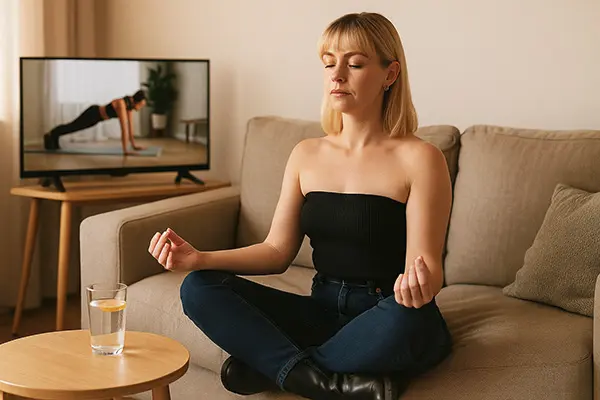
Frequently Asked Questions
It’s the mental and physical tiredness from too much screen time, often from constant notifications, emails, or social media.
Digital burnout is a state of emotional and physical exhaustion from prolonged device use, leading to apathy, low motivation, and stress.
It’s when your brain’s overwhelmed by too much digital input, like notifications or social media, making it hard to focus or relax.
Chronic tiredness, irritability, headaches, trouble sleeping, and difficulty concentrating are common signs.
It’s feeling swamped by the volume of digital info, like emails or news, leading to stress and mental fog.
It’s the exhaustion and disengagement from spending too much time on social media, often from comparison or drama.
Restlessness, racing heart, sweating, and a constant need to check devices are key signs.
Set boundaries like tech-free times, mute notifications, practice mindfulness, and take breaks to recharge.
This isn’t a standard term, but it likely refers to symptoms like fatigue, irritability, and focus issues from device overuse.
Anxiety, tension, irritability, and physical discomfort like headaches from constant digital exposure.
It’s a behavioral addiction where you feel compelled to use devices excessively, impacting daily life and responsibilities.
✨ Last updated on 02.08.2025
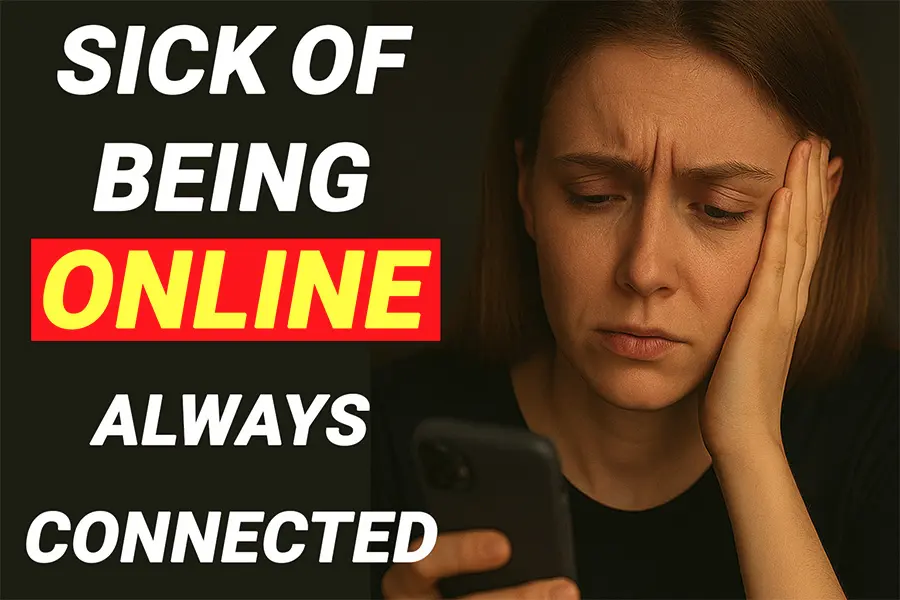




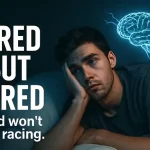





Leave a Reply